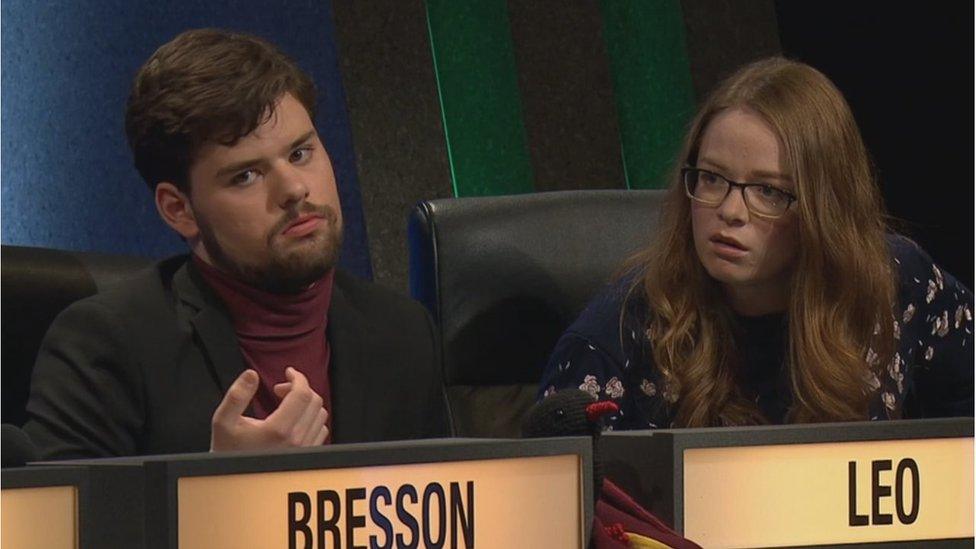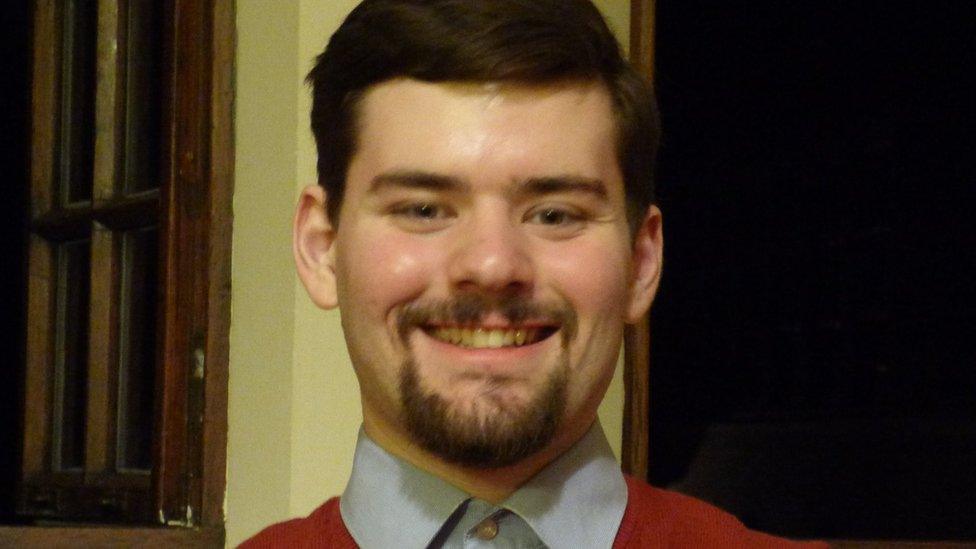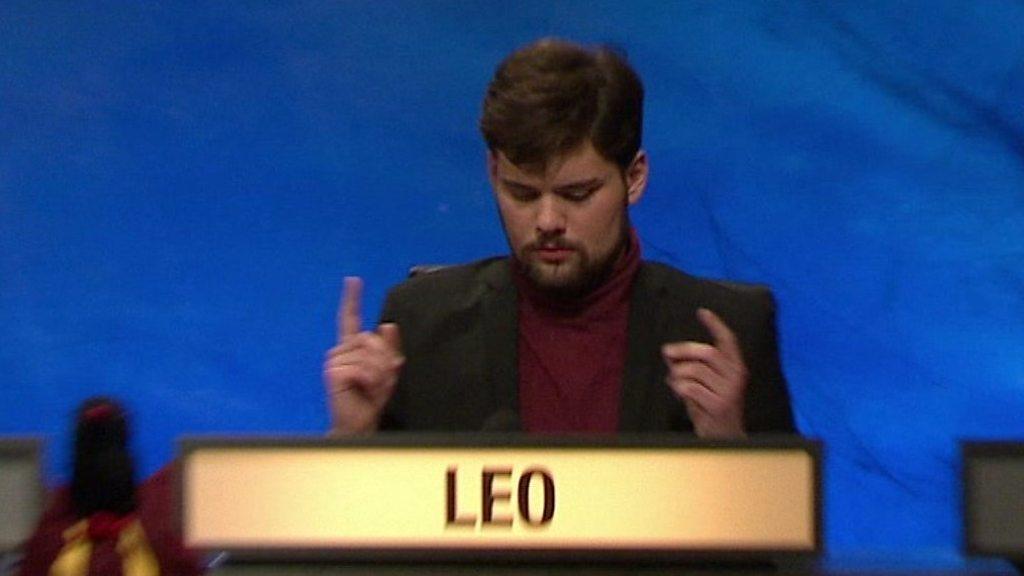University Challenge: What's behind Freddy Leo's rapid buzzing?
- Published
Freddy Leo's best University Challenge buzzes
What does it take to win University Challenge? Extensive knowledge, sure.
But one of this year's contestants - described as the "Cristiano Ronaldo" of the show - says he may have found an edge: hammering the buzzer really, really quickly.
Many viewers were left in awe of Freddy Leo's knowledge and sharp action during this week's quarter-final.
One viewer dubbed Leo, captain of the team from Oxford University's St Edmund Hall, "the quickest on the buzzer ever".
But the jolty nature of his buzzing left another wondering if someone had "rigged all the buzzers to give Leo an electric shock".
He had the highest average points score of the tournament before Monday's episode.
And despite the questions getting harder in this later stage of the competition he enjoyed one of his best showings yet.
Quicker reflexes?
This week, the Berlin-born history undergraduate answered all of his side's 11 successful "starter for 10" questions and racked up his highest personal tally - scoring 143 points, according to University Challenge Stats., external
He fired off answers on questions about topics including Albert Einstein's writings, actor and director Sidney Poitier, and synecdoche (a figure of speech in which a part is made to represent the whole or vice versa).
One viewer even asked: "Is St Edmund's Leo plugged directly into Wikipedia?"
But Leo says he was not aware his performance and rapid buzzing method was in anyway remarkable until he got backstage.
"I was with my teammates after and one of them did mention the way I pressed the buzzer," he said this week.
"They said maybe it was a little unique but the reaction to it was quite surprising."
So why was he hammering the buzzer so hard? Well, it could be helping his game.
The former scout, who celebrated his 20th birthday the week before Monday's episode, suggests he's making the most of his youthful reactions.

Freddy Leo and teammate Lizzie Fry consult before they successfully answer a question on Laurence Olivier
"There's a bit of debate in the University Challenge world on whether it's really fair for older contestants to take part (against younger students)," he says.
"Some people say you can have three to four times as long to accumulate the knowledge.
"When you're 20 you're in the middle of your studies which you can dedicate yourself to in a way you perhaps can't if you have a family and a day job.
"And, of course, when you're younger your impulses and reflexes are that much quicker."
The average age of his "Teddy Hall" college side was 19 - one year younger than Monday's opponents from Emmanuel College, Cambridge.
And Leo admits it might not have made the difference in his side's 190-55 win.
But he suggests we can expect more rapid buzzes in their second quarter-final bout.
'Just something to enjoy'
In a quiz that is notorious for its difficulty and is chaired by a doyen of tough-questioning, anything can happen, says Leo.
"It's a very stressful situation: you have Jeremy Paxman, the audience and the lights - I just did what works for me."
Leo moved to Oxford after being eager to study at an English-speaking university, within a short flight from home in Germany.
He says he hopes to work in journalism or academia after graduating next year, once he's completed his thesis on the 1968 student uprising against the government in West Germany.
It's not the first time he has attracted attention for his appearances on the show.

Leo's interests include philosophy, art and literature
In an earlier round, some viewers noticed he was "left hanging" when he went for a high five after getting yet another question right.
That was simply down to the team's "casual" approach to the programme, he says.
He and other team members, Marceline Bresson, Lizzie Fry and Agastya Pisharody, enjoyed re-uniting with other sides from the show at the Oxford University Quiz Society's annual meeting recently.
"Our philosophy has been to turn off the competition aspect to it. Not to think are we winning, losing or thinking if we're on TV in a couple of months," he adds
"It's just something to enjoy."
And plenty did:
Allow X content?
This article contains content provided by X. We ask for your permission before anything is loaded, as they may be using cookies and other technologies. You may want to read X’s cookie policy, external and privacy policy, external before accepting. To view this content choose ‘accept and continue’.

Allow X content?
This article contains content provided by X. We ask for your permission before anything is loaded, as they may be using cookies and other technologies. You may want to read X’s cookie policy, external and privacy policy, external before accepting. To view this content choose ‘accept and continue’.

Allow X content?
This article contains content provided by X. We ask for your permission before anything is loaded, as they may be using cookies and other technologies. You may want to read X’s cookie policy, external and privacy policy, external before accepting. To view this content choose ‘accept and continue’.

Allow X content?
This article contains content provided by X. We ask for your permission before anything is loaded, as they may be using cookies and other technologies. You may want to read X’s cookie policy, external and privacy policy, external before accepting. To view this content choose ‘accept and continue’.

Allow X content?
This article contains content provided by X. We ask for your permission before anything is loaded, as they may be using cookies and other technologies. You may want to read X’s cookie policy, external and privacy policy, external before accepting. To view this content choose ‘accept and continue’.
- Published21 February 2019
